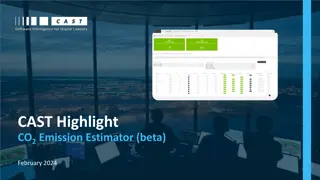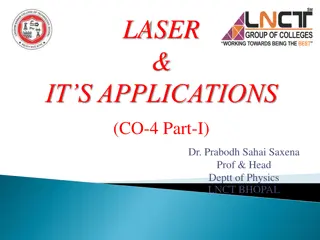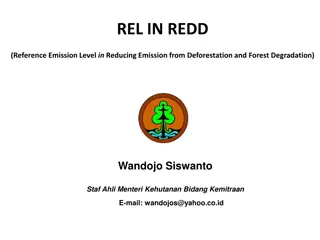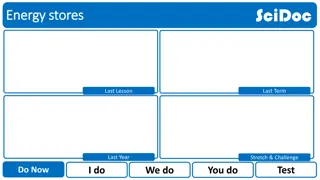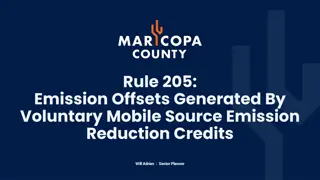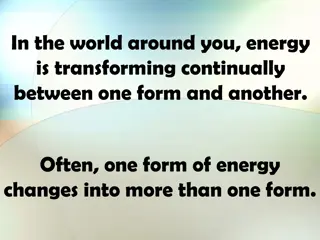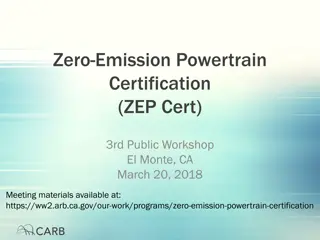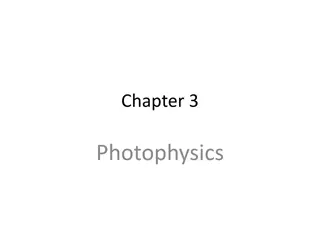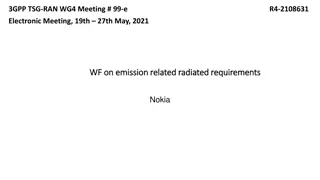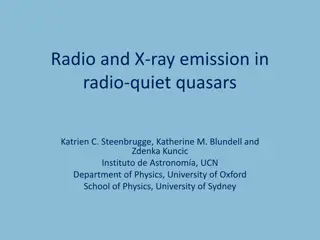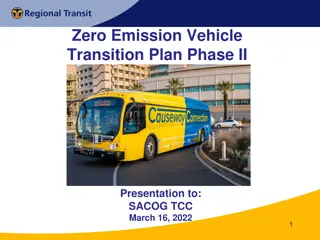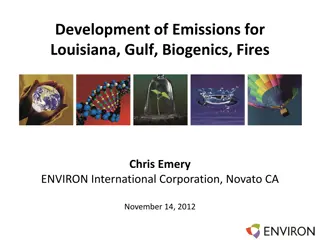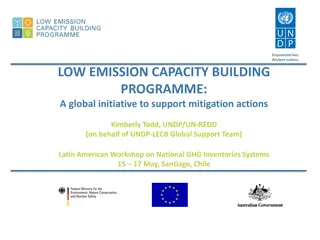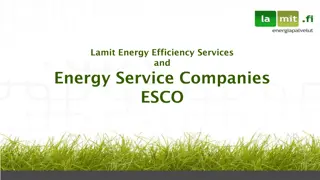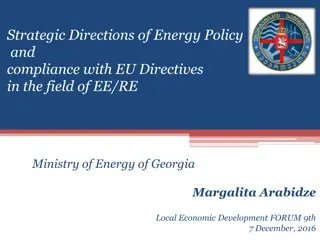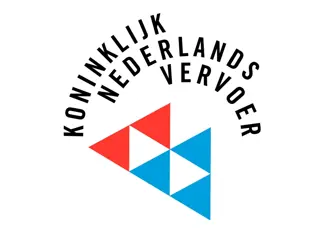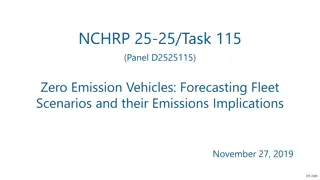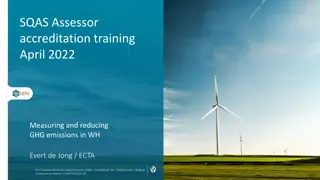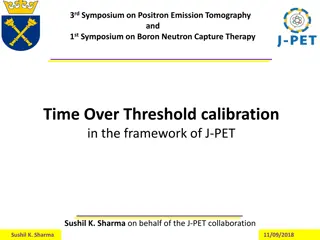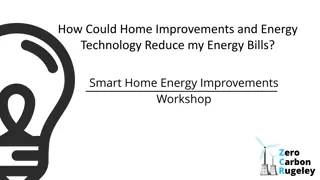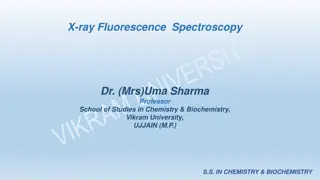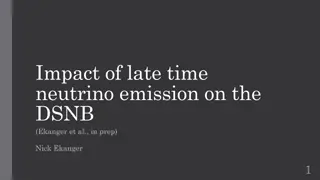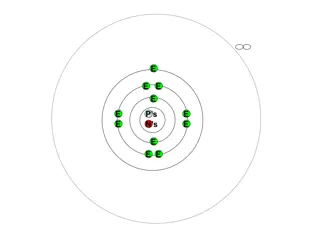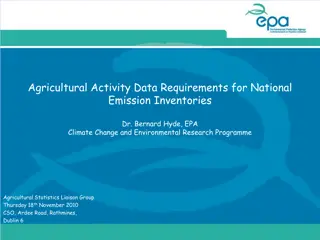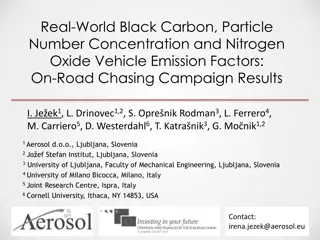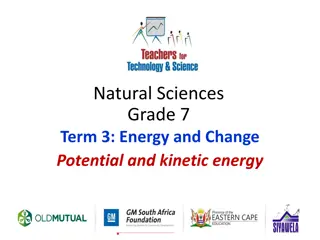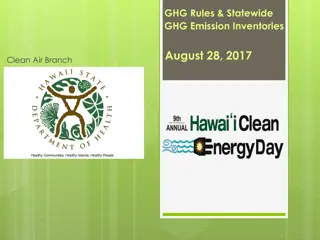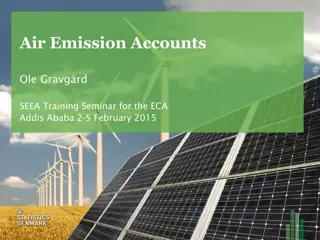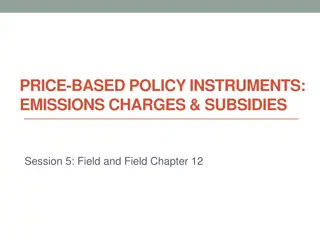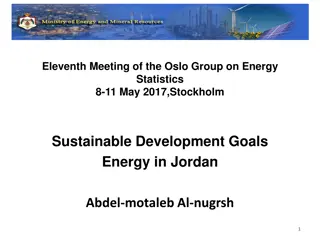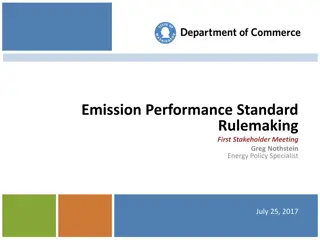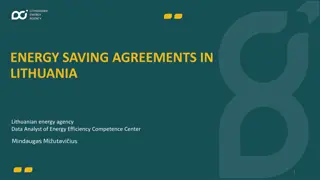Green Energy Market
Green energy also referred to as clean energy, is usually derived from natural sources that are constantly replenished. Solar energy, wind energy, hydroelectric power, biomass energy, geothermal energy, tidal energy, and wave energy are different types of renewable energy. Solar energy is the radian
6 views • 6 slides
Comprehensive Overview of Energy Balances in Germany
This material covers various aspects of energy balances in Germany, including components of energy flowcharts, renewable energy sources in the German energy balance, and total final consumption of road transport energy. It provides a detailed analysis of energy imports, domestic extraction, losses,
2 views • 10 slides
Developing the CAST Highlight CO2 Emission Estimator (Beta) - February 2024
CAST Research Labs studied the impact of removing green deficiencies detected by CAST Highlight on CO2 emissions and energy consumption in custom software applications. The study led to a formula for estimating potential CO2 emission reductions, which was integrated into the new CAST Highlight CO2 E
0 views • 11 slides
Sustainable Energy Initiatives at Local Level in Lithuania
The National Parliamentary Workshop on Energy Efficiency highlighted the importance of renewable energy development and sustainability at the local level in Lithuania. Initiatives such as the Breakthrough package and Renewable Energy Communities aim to improve energy efficiency, reduce energy povert
2 views • 12 slides
Efficient Stack Emission Monitoring Procedure for Air Quality Control
Stack emission monitoring is crucial for industries to assess and reduce pollutants in exhaust air. This procedure involves tasks like measurement, testing, and analysis of flue gases. Sampling sites are selected strategically for accurate readings, and molecular weight and gas velocity are determin
1 views • 11 slides
Understanding Laser Technology: Principles, Applications, and Einstein's Coefficients
Exploring the fascinating world of lasers, this content delves into the principles governing laser technology, including the concept of stimulated emission by Einstein. It covers the characteristics of lasers, different types, and the significant contributions of pioneers in the field. The explanati
0 views • 14 slides
Understanding Reference Emission Level in REDD
REDD (Reducing Emission from Deforestation and Forest Degradation) involves a system for producing carbon credits, including steps like setting baseline emission levels, devising deforestation reduction strategies, monitoring changes, managing carbon credit sales, and distributing income. Organizati
0 views • 10 slides
Exploring Energy Stores and Transfers in Science Lessons
Dive into the fascinating world of energy stores and transfers through engaging science lessons. Recall different energy stores, common energy transfers, and create flow diagrams to illustrate energy transfers in various scenarios. Explore gravitational, elastic, magnetic, electrostatic potential en
5 views • 9 slides
Energy Assistance Workshop Series Statewide Assessment
The Energy Assistance Workshop Series conducted a statewide assessment to understand energy burden and discuss utility energy assistance programs. The goal was to evaluate the effectiveness of mechanisms for energy assistance to prioritize households with higher energy burdens. The workshops aimed t
0 views • 26 slides
Compliance Guide for Rule 205: Emission Offsets & Mobile Source Credits
Rule 205 outlines the process for generating emission offsets through voluntary mobile source emission reduction credits in Maricopa County. The rule-making process, state implementation plan submission, and permit conditions related to Rule 205 are discussed. The preparation for compliance includes
0 views • 7 slides
Understanding Energy Transformation in the Natural World
Energy transformation occurs continuously in various forms around us, following the Law of Conservation of Energy. From thermal to chemical and electromagnetic energy, different types of energy are converted and utilized in everyday processes. Examples include the conversion of thermal energy to ele
0 views • 27 slides
Understanding Energy - Forms, Calculations, and Applications
Explore the concept of energy through various images, including forms of energy, kinetic versus potential energy, and calculations involving kinetic and potential energy. Learn about identifying energy states, calculating kinetic energy, and solving physics problems related to energy transfer. Dive
0 views • 27 slides
Understanding the Principle and Working of Semiconductor Lasers
Semiconductor lasers operate through absorption, spontaneous emission, and stimulated emission processes. Absorption of radiation causes electrons to jump to higher energy levels, leading to light emission. Spontaneous emission is when excited electrons return to ground state by emitting photons, wh
3 views • 17 slides
Zero-Emission Powertrain Certification Workshop Highlights
Workshop materials and agenda from the Zero-Emission Powertrain Certification 3rd Public Workshop held in El Monte, CA on March 20, 2018, discussing the ZEP Cert framework, applicability, testing, monitoring requirements, and more. The workshop aimed to accelerate the adoption of zero-emission techn
1 views • 24 slides
Understanding Photophysics: Emission and Luminescence Processes
Photophysics explores the emission and loss processes in luminescent phenomena, named based on the excitation mode of energy-rich species. Different types of luminescence include fluorescence, phosphorescence, and chemiluminescence. Bioluminescence in nature, such as in fireflies and dinoflagellates
0 views • 20 slides
Emission Requirements Discussion at 3GPP TSG-RAN-WG4 Meeting #99-e
Discussion at the 3GPP TSG-RAN-WG4 Meeting #99-e focused on emission-related radiated requirements for DL and UL in relation to adjacent channel protection in NR specifications. Various options and candidates for defining ACLR were explored, along with considerations for spurious emissions and OBUE
1 views • 5 slides
Insights into Radio and X-ray Emission in Radio-Quiet Quasars
Radio galaxies are categorized as radio-loud or radio-quiet based on the presence of jets and lobes. Unlike radio-loud quasars, the nuclear radio emission in radio-quiet quasars does not originate from large-scale jets. Possible explanations include broad absorption lines, magnetically accelerated e
0 views • 15 slides
Zero Emission Vehicle Transition Plan Phase II Presentation to SACOG TCC
California Air Resources Board (CARB) mandated the transition to 100% zero-emission fleets by 2040 for all transit agencies, leading SACOG to roll out Zero Emission Bus (ZEB) programs. The ZEV Planning Phase II report details the introduction, garage concepts, ZEB transition, costs, and next steps i
0 views • 10 slides
Detailed Overview of Emissions Development in Louisiana
Emissions Processing System (EPS3) generates chemically speciated, gridded formats required by CAMx, with a focus on raw annual/ozone season county/parish-level emission inventory files and support data. Spatial and temporal profiles, along with cross-reference files, are essential for this work, co
1 views • 27 slides
Global Low Emission Capacity Building Programme Overview
The Low Emission Capacity Building Programme is a global initiative by UNDP aimed at enhancing capacities for designing and implementing Low Emission Development Strategies and national mitigation actions in various sectors. It includes components like GHG inventory management, NAMAs, LEDS, MRV, and
0 views • 12 slides
Understanding Different Forms of Energy and Work in Physics
Energy in physics is the capacity to do work, and there are various forms of energy such as radiant energy, kinetic energy, gravitational potential energy, elastic potential energy, chemical potential energy, nuclear potential energy, electrical potential energy, thermal energy, and sound energy. Ea
0 views • 47 slides
Understanding Energy Service Companies (ESCOs) and Their Role in Energy Efficiency
Energy Service Companies (ESCOs) like Lamit offer a range of energy services, from implementing energy-efficiency projects to renewable energy solutions. These companies work as long-term energy management partners, focusing on understanding customer needs, providing energy-saving solutions, and gua
2 views • 18 slides
Overview of Energy Policy and Compliance with EU Directives in Georgia
Ministry of Energy in Georgia focuses on strategic directions for energy policy in alignment with EU directives. The Energy Strategy, Covenant of Mayors, and National Energy Efficiency Action Plan are key initiatives promoting energy efficiency and renewable energy. Projects include consultancy on s
0 views • 10 slides
Insights into the Dutch Coach Industry and Low Emission Zones
Discover the Dutch coach industry landscape, including the market share of KNV members, emission regulations in low emission zones, and challenges faced by coach companies like Leo Ringelberg Touringcars. Explore how KNV is advocating for cleaner coaches and addressing restrictions in important tour
0 views • 17 slides
Zero Emission Vehicles: Forecasting Fleet Scenarios & Emissions Implications
This research project, conducted by Louis Berger U.S. Inc. & Sonoma Technology Inc., explores the implications of adopting zero emission vehicles through forecasting fleet scenarios and estimating emissions reductions. The study assesses the potential increase in zero emission vehicle population, em
0 views • 42 slides
Greenhouse Gas Emissions Management in Warehouse Operations
The SQAS Assessor accreditation training in April 2022 focused on measuring and reducing greenhouse gas emissions in warehouse operations. The content covers emission questions, scope of emissions, energy consumption examples, disaggregation of emissions, emission intensity calculation, and strategi
0 views • 17 slides
Symposium on Positron Emission Tomography and Boron Neutron Capture Therapy Time-Over-Threshold Calibration in J-PET
The 3rd Symposium on Positron Emission Tomography and 1st Symposium on Boron Neutron Capture Therapy focused on Time-Over-Threshold calibration within the framework of J-PET. The event outlined experimental details, event selection, results, and key features of the Jagiellonian Positron Emission Tom
0 views • 35 slides
Exploring Home Energy Improvements and Smart Technology for Energy Efficiency
Discover how home improvements and energy technology can significantly reduce energy bills. Join the Smart Home Energy Improvements Workshop in Zero Carbon Rugeley to explore approaches for sustainable energy production and usage at home. Learn about retrofitting, smart energy systems, and meet char
0 views • 20 slides
Applications and Importance of X-ray Fluorescence Spectroscopy in Analytical Chemistry
X-ray Fluorescence Spectroscopy (XRF) is a vital analytical technique used for qualitative and quantitative analysis of elements based on their X-ray emission characteristics. Dr. Uma Sharma, a Professor at Vikram University, details various X-ray analytical methods, including X-ray emission, Auger
0 views • 21 slides
Late-Time Neutrino Emission Impact on DSNB Study
Explore the implications of late-time neutrino emission on the Diffuse Supernova Neutrino Background (DSNB) through core collapse supernovae simulations. The research delves into the dynamics of neutrino emission in different phases of supernova events and its relevance to understanding the DSNB.
0 views • 15 slides
Understanding Atomic Electron Shells and Energy Levels
Exploring how electrons move between energy levels in atoms, providing insights into electron shells and emission spectra. The progression from heat energy to light emission is visualized, shedding light on the arrangement of electron shells and the concept of energy level diagrams.
0 views • 12 slides
Agricultural Emission Inventory Data Reporting Requirements
This presentation discusses the data requirements for national emission inventories in the agricultural sector, covering greenhouse gas inventories, air pollutant inventories, National Inventory Reports, Large Combustion Plant Directive, National Emission Ceilings Directive, livestock emissions, and
0 views • 13 slides
Real-World Black Carbon & Nitrogen Oxide Vehicle Emission Factors Study
This study presents real-world data on black carbon (BC) and nitrogen oxide (NO) vehicle emission factors gathered through on-road chasing campaigns. The research explores the influence of dilution and vehicle performance on emission factor calculations, with a focus on measuring emissions from vehi
0 views • 13 slides
Understanding Energy: Potential and Kinetic Forms in Grade 7 Natural Sciences
Energy in various forms is explored in Grade 7 Natural Sciences, with a focus on potential and kinetic energy. Energy is the ability to do work and exists in different types like heat, chemical, electromagnetic, nuclear, and mechanical. The sun serves as a primary energy source. Potential energy is
0 views • 11 slides
Hawaii Statewide Greenhouse Gas Emission Rules Overview
The Hawaii Statewide Greenhouse Gas (GHG) Emission Rules implemented by Act 234 in 2007 aim to limit statewide GHG emissions to 1990 levels by 2020. The rules include setting emission caps for stationary sources, conducting annual evaluations to track progress, and reporting GHG inventories regularl
0 views • 9 slides
Understanding Air Emission Accounts and Bridge Tables
Flows of air emissions, including gaseous and particulate substances released into the atmosphere, are recorded in Air Emission Accounts following specific guidelines and considerations. Bridge tables play a crucial role in reconciling differences between national economy totals and emission invento
0 views • 18 slides
Understanding Emission Charges for Environmental Policy
Explore the concept of emission charges as a policy instrument, where firms pay charges for every unit of effluent discharged to reduce emissions. The regulator sets the price to achieve efficient emission levels. Learn about setting charges in competitive environments, total abatement costs, and th
0 views • 18 slides
Energy Strategy and Challenges in Jordan: Towards Sustainable Development
The Eleventh Meeting of the Oslo Group on Energy Statistics discussed the energy sector in Jordan, highlighting challenges such as population growth, energy demand, and high energy costs. Jordan aims to diversify energy resources, reduce oil dependency, and enhance environmental protection through i
0 views • 34 slides
Washington State Emission Performance Standard Rulemaking Stakeholder Meeting Overview
This document provides detailed insights into the first stakeholder meeting regarding the Emission Performance Standard Rulemaking in Washington State. It covers key agenda items, reviews of RCW 80.80 GHG Emission Performance Standard, definitions related to CCCT and baseload electric generation, an
0 views • 19 slides
Energy Saving Agreements in Lithuania: Legal Framework and Targets
Lithuania's energy saving agreements are guided by a comprehensive legal framework including laws on energy efficiency and methodologies for energy audits. The country has set ambitious energy efficiency targets for 2030, focusing on sectors like building renovation, industry, and household applianc
0 views • 14 slides


